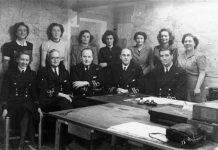Today is Wednesday, April 13, the 104th day of 2016. There are 262 days left in the year.
Highlights in history on this date:
1528 – Pope Clement VII establishes a commission to determine the validity of King Henry VIII’s marriage to Catherine of Aragon in England.
1589 – Britain’s Sir Francis Drake and Sir John Norris launch expedition of 150 ships and 18,000 men to Portugal.
1598 – France’s King Henry IV, formerly a Protestant, signs Edict of Nantes, granting a large measure of religious liberty to Protestant Huguenots and ending 40 years of religious strife and civil war.
1742 – G. F. Handel conducts first performance of the “Messiah” in Dublin.
1772 – Warren Hastings is appointed Governor of Bengal in India. He later sets up the first colonial administration in Bengal.

1796 – French forces under Napoleon Bonaparte defeat Austrians at Millesimo in northern Italy.
1848 – Sicily is declared independent of Naples.
1868 – British forces under Robert Napier capture Magdala in Ethiopia.
1909 – Army counterrevolution in Constantinople against rule of Mohammedan Union in what is now Turkey.
1919 – British troops fire on a political gathering in Amritsar, India, killing 379 people.
1923 – The Illinois state legislature votes to allow women to serve on juries.
1943 – U.S. President Franklin D. Roosevelt dedicates the Jefferson Memorial in Washington, D.C.
1961 – U.N. General Assembly condemns South African apartheid.
1964 – Sidney Poitier becomes the first black to win an Academy Award for best actor, for his role in “Lilies of the Field.”
1975 – Fighting rages in South Vietnam’s Mekong Delta as Communists drive to take city of Xuan Loc; civil war breaks out in Lebanon.
1981 – Washington Post reporter Janet Cooke receives a Pulitzer Prize for her feature about an 8-year-old heroin addict named “Jimmy.” Cooke relinquishes the prize two days later, admitting she had fabricated the story.
1986 – Stampede by Hindu pilgrims kills at least 46 people and injures 39 others at a religious festival northeast of New Delhi; Pope John Paul II visits a Rome synagogue in the first recorded papal visit of its kind.
1989 – Independent Solidarity trade union in Poland files for registration after seven-year ban.
1990 – The Soviet Union accepts responsibility for the World War II murders of thousands of imprisoned Polish officers in the Katyn Forest, a massacre the Soviets had previously blamed on the Nazis.
1992 – Hundreds of foreigners scramble for seats on the last flight out of Libya before sanctions seal off the country.
1993 – Twelve men accused of plotting the 1991 coup against Soviet President Mikhail Gorbachev go on trial for treason.
1994 – An apparent suicide bomb rips though a bus jammed with soldiers and civilians, killing six people and wounding 28 in Hadera, Israel.
1995 – Ukraine agrees to close by 2000 the Chernobyl nuclear reactor, the site of an accident in 1986 that resulted in massive radioactive pollution.
1996 – Warring factions in Liberia negotiate a cease-fire with help from visiting West African politicians as nearly 1,500 terrified foreigners flee.
2000 – A Zimbabwe court rules that the government and police must bring an end to black squatters’ occupations of white-owned farms.
2002 – The Permanent Court of Arbitration in The Hague, the Netherlands, defines the 1,000-kilometer (620-mile) shared border between Ethiopia and Eritrea, ending a dispute that sparked a 1998-2000 war between the two African nations.
2003 – Canadian Prime Minister Jean Chretien says he is prepared to send Royal Canadian Mounted Police to assist in restoring order to postwar Iraq.
2004 – Ousted Liberian warlord-president Charles Taylor defends his deadly tenure at the helm of his war-ravaged West African nation and challenges the United Nations to find any foreign bank account linked to his name in his first interview since fleeing to Nigeria the previous year.
2005 – Eric Rudolph pleads guilty to carrying out the deadly bombing at the 1996 Atlanta Olympics and three other attacks, saying he picked the Summer Games to embarrass the U.S. government in front of the world “for its abominable sanctioning of abortion on demand.”
2006 – Thousands of distraught fans smash cars, burn buses and battle with police in the streets of Bangalore, angry over being prevented from viewing the body of south Indian film icon Raj Kumar.
2007 – Unidentified gunmen kill top Nigerian Muslim hard-liner, Mahmud Adam, as he leads morning prayers along with his second-in-command in the northern city of Kano.
2008 – Kenyan President Mwai Kibaki names Raila Odinga as prime minister, implementing a long-awaited power-sharing deal that the two rivals signed more than a month earlier to resolve a protracted political crisis.
2009 – In a measured break with half a century of U.S. policy toward communist Cuba, the Obama administration lifts restrictions on Cuban-Americans who want to travel and send money to their island homeland.
2010 – President Barack Obama gives a surprisingly downbeat assessment of the chances for a U.S.-brokered peace settlement in the Middle East, saying that the United States cannot help if Israel and the Palestinians decide they cannot negotiate.
2011 – NATO launches new airstrikes on targets held by Moammar Gadhafi as the rebel movement urges a stronger air campaign that will allow them to advance on territory held by the Libyan leader’s forces.
2012 – Syrian forces use live fire, tear gas and clubs to beat back tens of thousands of protesters who take to the streets across the country in powerful and often jubilant displays of defiance.
2013 — The U.S. and China agree to rid North Korea of nuclear weapons in a test of whether the world powers can shelve years of rivalry and discord and unite in fostering global stability.
2014 – Turning to force to try to restore its authority in the vital industrial east, Ukraine’s government announces it is sending in troops to try to quash an increasingly brazen pro-Russian insurgency, despite repeated warnings from the Kremlin.
2015 – A federal judge sentences a former Blackwater security guard to life in prison and three others to 30-year terms for their roles in a 2007 shooting in Baghdad that killed 14 Iraqi civilians and wounded 17 others.
Today’s Birthdays:
Thomas Jefferson, U.S. president (1743-1826); Lily Pons, French opera singer (1904-1976); Samuel Beckett, Irish writer (1906-1989); Seamus Heaney, Irish poet and Nobel laureate (1939-2013); Paul Sorvino, U.S. actor (1939–); Garry Kasparov, Russian world chess champion (1963–); Ricky Schroder, U.S. actor (1970–); Al Green, U.S. R-and-B singer (1946–).
Thought For Today:
There never was yet a truly great man that was not at the same time truly virtuous — Benjamin Franklin (1706-1790), U.S. statesman, inventor and author.
Copyright 2016 The Associated Press. All rights reserved. This material may not be published, broadcast, rewritten or redistributed.




